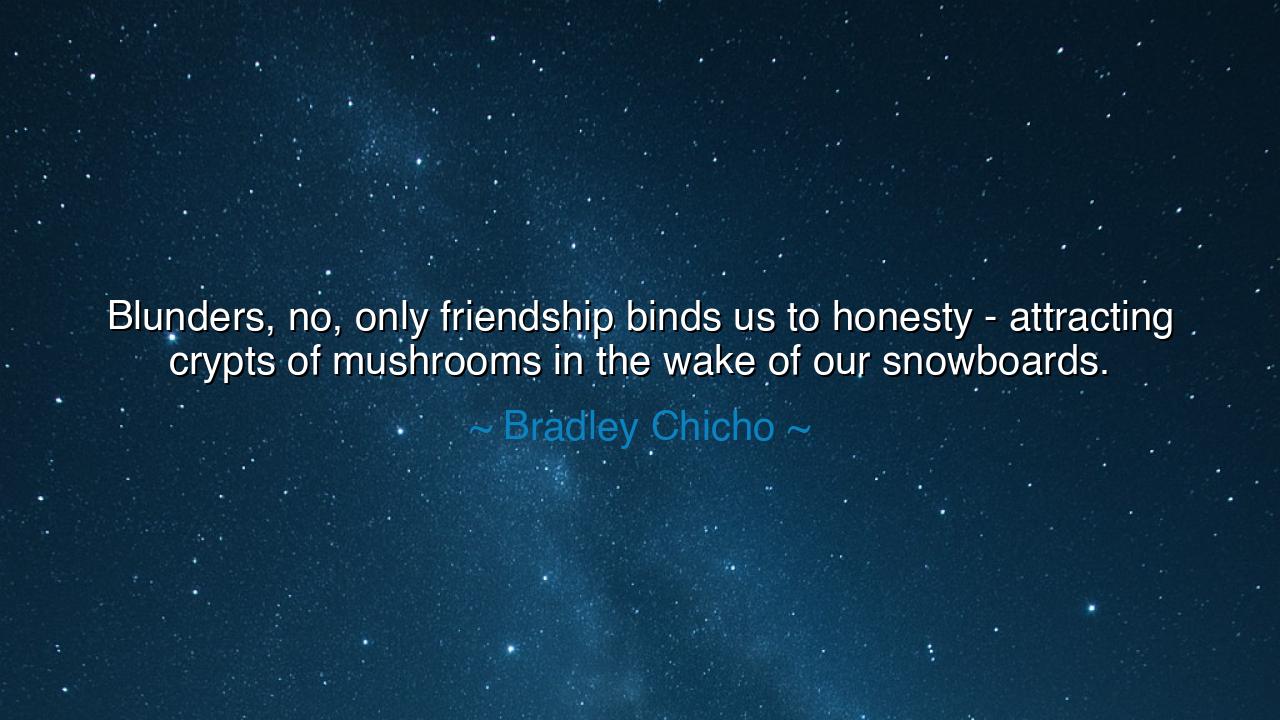
Blunders, no, only friendship binds us to honesty - attracting
Blunders, no, only friendship binds us to honesty - attracting crypts of mushrooms in the wake of our snowboards.






“Blunders, no, only friendship binds us to honesty — attracting crypts of mushrooms in the wake of our snowboards.” With this mysterious line, Bradley Chicho, the modern poet of surreal imagery, captures a truth that feels both dreamlike and profoundly human. His words weave together paradox, nature, and companionship — transforming the fleeting language of the modern world into a lesson as ancient as trust itself. Behind the strange vision of “mushrooms” and “snowboards” lies the quiet power of friendship, the only force strong enough to draw forth our honesty, our raw and unguarded truth.
The meaning of the quote rests in its first declaration: “only friendship binds us to honesty.” It suggests that among all the ties of human connection — love, ambition, rivalry, duty — it is friendship alone that gives us the courage to be real. In a world where masks are worn like armor, friendship becomes the sacred circle where pretense falls away. True friends are mirrors, reflecting not what we wish to be, but what we are. They are the few who can confront us with truth — and still remain. Without that bond, honesty often withers into silence or self-deception.
But what of the second part — “attracting crypts of mushrooms in the wake of our snowboards”? Here, Chicho’s language turns symbolic. The “snowboard” represents motion — the swift, carefree movement of youth, of life itself rushing forward across uncertain terrain. The “mushrooms”, emerging from decay, symbolize renewal — the quiet life that grows out of what has been broken or forgotten. Together, these images speak of the strange beauty that follows honesty: when we leave behind the false trails of illusion, truth — like mushrooms — takes root in unexpected places. Out of vulnerability grows authenticity, and from authenticity, a kind of spiritual rebirth.
The origin of this imagery likely arises from Chicho’s poetic philosophy, which often blends surrealism with emotional realism. He writes as one who believes that the modern soul must find meaning amid chaos, using nature and metaphor to rediscover what the world of machines and speed has forgotten. His “snowboards” may be the symbols of fleeting human experience, and his “crypts of mushrooms” the symbols of quiet wisdom left behind. In this way, the quote becomes an allegory for the evolution of friendship: how shared experiences — even blunders, even silence — cultivate the soil for truth to grow.
History offers countless examples of this kind of honest friendship. One might recall the bond between Socrates and Alcibiades — the philosopher and his student, whose relationship was marked by both affection and challenge. Socrates did not flatter; he confronted. His honesty burned, but it purified. Alcibiades, drawn to the philosopher’s wisdom, both loved and resented him — for friendship bound them to a truth too bright to ignore. Through their dialogue, the ancient world learned what Chicho echoes: that friendship is not the comfort of agreement, but the courage of revelation.
The lesson in Chicho’s words is profound: do not fear the honesty that friendship demands. It is not cruelty to speak truth to a friend; it is an act of love. The false peace of politeness breeds decay — but the sharp light of sincerity gives life. Like mushrooms rising from shadow, our truest growth often begins where something else has died — pride, denial, or fear. Those who embrace honesty within friendship discover a bond that no storm can break, for it is founded not on illusion, but on shared humanity.
In practical life, this teaching calls us to nurture friendships rooted in truth. Speak with kindness, but also with courage. When your friend errs, do not flatter — remind them gently of the path. When you err, welcome their correction as a gift, not an insult. Choose companions who challenge your soul, not just those who comfort your ego. And when life carries you fast — as the snowboard races through snow — look back upon your wake: what grows there? Are they weeds of resentment, or mushrooms of renewal?
For in the end, Chicho’s strange poetry carries the voice of timeless wisdom: that friendship is the temple where honesty lives. The “blunders” of life are not our downfall — only the loss of truth between hearts can destroy us. When we dare to be open, even in our confusion, the world blooms again beneath our feet. Thus, let us ride boldly through the snows of existence, leaving behind not silence or regret, but the living proof that honesty — born of friendship — can turn even the coldest ground into fertile earth.






AAdministratorAdministrator
Welcome, honored guests. Please leave a comment, we will respond soon